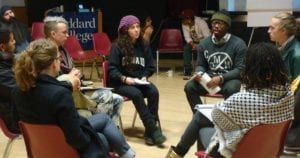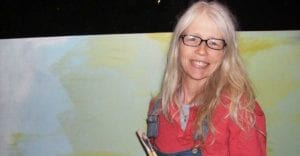 Once upon a time in Virginia, the artistic director of a theater read an op-ed of mine about the sanctimonious homophobe who was our state’s attorney general, and asked me to try my hand at writing about him for the stage. The politician in question had been sending up trial balloons for a run for national office. So frequently and ostentatiously had he opined about the evils of liberalism that he had become a national hero of the Tea Party.
Once upon a time in Virginia, the artistic director of a theater read an op-ed of mine about the sanctimonious homophobe who was our state’s attorney general, and asked me to try my hand at writing about him for the stage. The politician in question had been sending up trial balloons for a run for national office. So frequently and ostentatiously had he opined about the evils of liberalism that he had become a national hero of the Tea Party.
Since I’m not much of a playwright, the tragicomedy I set out to create emerged as more of a farce. The attorney general, having sought and won the presidency, set out to dismantle the government. He dissolved the White House Press Corps. He prank-called other world leaders, hanging up on them or threatening war. He trusted no one but his beloved daughter. He commanded the Joint Chiefs of Staff to declare DEFCON 1, just for the sake of the adrenaline rush it gave him.
According to consensus, the story had fatal flaws of verisimilitude even for a farce. There was no overarching logic governing the hero’s actions. I agreed that that was a problem. As a fiction writer, I tend to examine human behavior for a particular kind of cause-and-effect succession. Good stories operate like domino chains of sequential reason. For example, the new president wants to start wars because he thinks they’ll create jobs. He repeats lies because all the famous Goebbels quotes tell him to. He antagonizes close allies because his hair-growth steroid causes aggression. But airtight narrative logic needs underlying consistency. Major actions must grow out of essential traits or fundamental longings. From what foundational need do the other desires stem? From the undying thirst for ever-increasing fame. Who are the most famous figures in history? Attila the Hun; Genghis Khan; Caligula; Ivan the Terrible—the great tyrants of the past. To attain their status, follow in their footsteps.
I would like to look back on 2017 and laugh at my overblown sentiments, and return to thinking the logics of reality and fiction have little in common. But lately, watching in weak dismay while cartoon villains race to tear down the world, I’ve been feeling like reality has developed verisimilitude flaws. Meanwhile my belief in the power of art to sway its audience approaches a low ebb. More artists are alive and at work today than ever in history. They’re unanimously, loudly opposed to the cabal of crooks at our helm. Storytellers from Margaret Atwood to 84 Lumber’s ad writers are showing us the human costs of isolationism and totalitarianism. We seem to have shut our eyes and ears.
In my play the gleeful brinksmanship of my greedy hero felt like a defect in the narrative. I couldn’t deduce why a man who loved his children would court nuclear war just for the hell of it. The occupation I’ve chosen asks me to comprehend and dramatize human nature, but this part of human nature lies slightly beyond my grasp.







